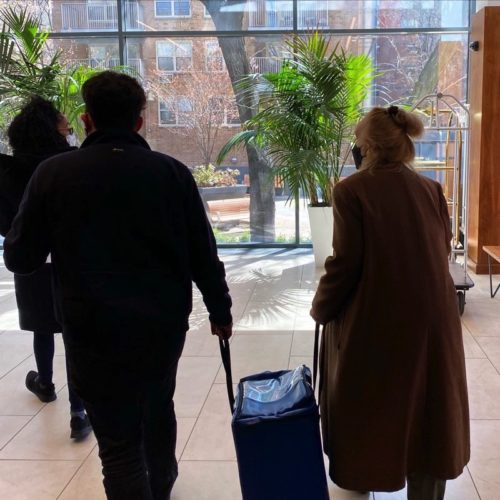
By Molly Sugarman
Imagine that you have $10.68 cents to prepare and deliver a healthy, religiously and culturally appropriate meal to a homebound person.
That includes shopping for the ingredients, prepping and preparing the food, making sure you are delivering the right meal to the right person, and then driving to their home to deliver it. You’ll get another $.10 per meal for “indirect” costs, such as electricity, fuel, vans, drivers, and the infrastructure to manage it all.
Nonprofits serving homebound seniors are doing just that: delivering thousands of meals each day for a price that doesn’t match their costs, according to Councilmember Gale Brewer.
On Saturday, to highlight the need for more money for senior food programs, Brewer joined Jeremy Kaplan, executive director of Encore Community Services, to deliver meals to homebound seniors living in six Upper West Side buildings. Encore is one of many nonprofits serving seniors in Manhattan.
The demand for home-delivered meals is increasing as the number of seniors increases, but the funding isn’t rising at the same rate. People aged 60+ make up almost 21% of the city’s population, according to the Annual Plan Summary 2021- 2022 of the city’s Department for the Aging (DFTA) and will continue to do so as the population increases. By 2030, seniors will outnumber the under-18 population by a factor of 12, Brewer noted. That’s 12 seniors for every minor.
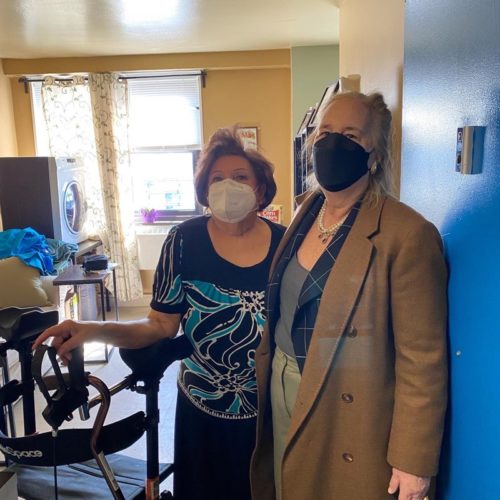
Homebound meal delivery provides more than nutrition, as Brewer found out during her deliveries. The seniors like to chat with the person delivering the meal, providing socialization. Moreover, the delivery person can note problems in the senior’s living conditions and notify a case manager. “For some, the volunteer delivering the meal is the only person the homebound senior sees,” Kaplan said.
For each of the meals it delivers, Encore receives $10.68, up from $9.58 last year, and rising to $11.78 in July, thanks to the advocacy of four borough presidents, including Brewer, when she was Manhattan Borough President last year.
As noted, DFTA also pays $.10 per meal for indirect costs, but it is not enough, Brewer said. For example, Encore needs $.18 per meal for indirect costs, she explained. Without it, they are losing more than $1 million each year.
“Right now, we get the funds to provide one meal a day,” Kaplan said. “In most cases, we are the only source of food [the seniors] have. We reach a finite number of people and even those aren’t getting enough food. Thousands more need meals and aren’t being reached.”
Encore now serves a half-million meals per year, 1,200 to 1,500 per day, Kaplan said. If funded, they could increase that to a million meals per year. That’s the need, Kaplan said, which isn’t being met.
And those half-million meals currently served are only possible because he has thousands of volunteers augmenting his small staff and because the staff is paid a subpar wage. “We have an obligation to take care of those who took care of us,” he said. “We need more of an investment.”
If senior services were funded adequately, Brewer said, seniors could get more than one meal a day, but the amount of money allocated to the Department for the Aging (DFTA) is “terrible,” she said. Less than 0.5% of the city’s budget is allocated for more than 21% of the population, she added.
Not only are more meals needed for homebound seniors, but also more senior centers and opportunities for cultural and social activities, Brewer said. Some of these needs are being met by grassroots effort, such as Bloomingdale Aging in Place, and smaller groups that have formed at Naturally Occurring Retirement Communities (NORCs), such as Lincoln Towers.
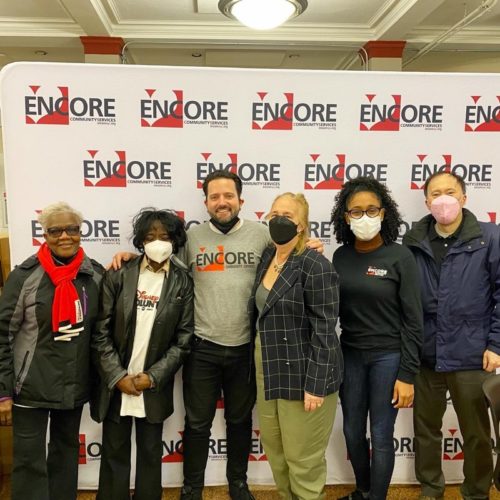
Ramping up senior services and centers is a tough call, Kaplan said, due to underpaid staff. Two social workers in Encore’s Senior Center see 2,500 to 3,000 people each year — helping with finances, health care, and crisis management.
“I can’t pay a social worker with a Master’s more than $50,000,” Kaplan said. “They can go to Starbucks and make more. We are really in a crisis situation in human services in New York City because we are not able to pay a living wage.”
“Senior issues are always a focus of mine,” Brewer said. “I will continue to advocate for a larger DFTA budget.”
To help seniors find their way through the web of agencies and organizations that provide services, Brewer is also compiling a booklet of every senior program in District 6. She and Community Board 7 each have a Senior Task Force as well.
“The budget is still in flux,” she said. “Write to the mayor and the Council to say we need more money!”
Photographs courtesy of Gale Brewer’s office.



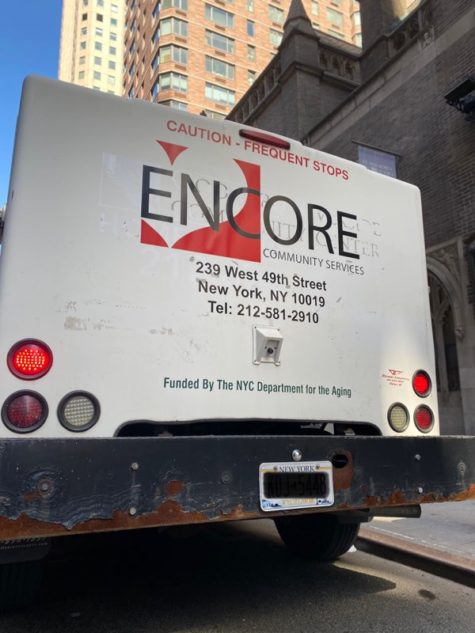
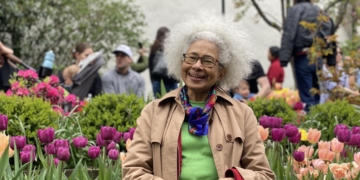




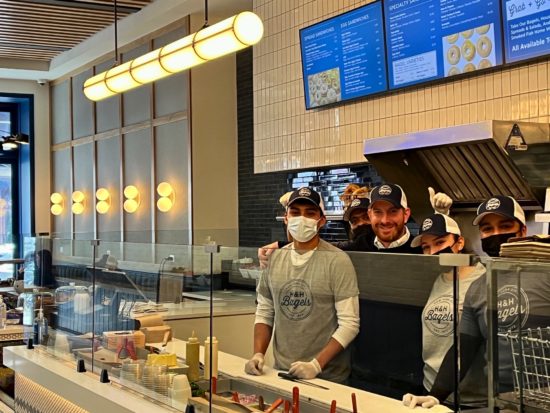
I know my statement will get a huge backlash but I speak the truth.
I am assuming that taxpayers are paying for these meals?
If my assumption is correct, then know that I have no intention of retiring in NYC because it is too expensive if you are living off retirement income. I intend to relocate to a state who does not tax retirement income. So, I won’t be a burden to taxpayers and expect them to pay for my meals.
With that being said, I don’t understand why anyone at any age lives in a city they can’t afford.
If I am incorrect in my assumptions, my apologies.
Perhaps people live here because they literally have nowhere else to go and/or no $$ to fund a move to anywhere else.
The reasons people need help are far more complex than you choose to understand.
Imagine you are 70 or 80 in poor health (not your fault, either, lest you continue to blame folks). You have no family. Your friends are the same age and also in ill health. You can barely walk and some cannot walk at all due to debilitating illness. Where you going to move? You don’t drive. Never have. Depend on deliveries of food, pharmacy, etc.
To move where you could afford? Where? The middle of nowhere in the burbs where you need a car, insurance for it, maintenance?
Seriously, have you not ever known anyone who has used up whatever savings they have; don’t have pensions and get little in the way of Social Security? You appear not to have and appear extremely judgmental.
I would rather my tax dollars go towards helping those in need than funding military weapons, etc Or corrupt ex-presidents and their crazy followers who spout white supremacy, Qanon nonsense and want to end our country’s democracy (Yea, that’s my rant.)
Let’s hope you never, ever need any social assistance.
FYI: You don’t speak THE TRUTH. You speak YOUR truth as we all do. Thankfully, not everyone feels as you do. Some people actually understand that there will always be others who need our help and will be happy to give it.
Moving to a low tax state like Florida, U’ll find that social services for the elderly ( supported by taxes!) are either very low or NON-existent and the state’s contributions to Medicaid are similarly low or non-existent. If U can drive your own car,have out-of-state relatives and health insurance beyond Medicare, why do U stay in our high tax state?
I suspect that many seniors live in rent-stabilized apartments, which were much more available when they were younger and would have leased them. Now, with housing prices skyrocketing, they probably couldn’t afford to leave the city if they wanted to.
I just looked up the states that don’t tax retirement income. Very random, and what’s a person to do if they don’t have friends or relatives already living in one of these states? Whether I can ‘afford’ to live in NYC or not, I can’t see relocating alone at the age of 70+ to any of these places. Never been to Vegas though so maybe it would be fun. 😉
Alaska, Florida, Nevada, New Hampshire, South Dakota, Tennessee, Texas, Washington and Wyoming.
Yeah, but what is the cost of living in those states?
Thank you Gale! Your work is always appreciated!
Response particularly to Joanne. Keep in mind that living almost anyplace other than NY requires owning a car and driving. The isolation of living in one of those low tax states without driving is hard to envision. Only a rare person can tackle a move to a strange land AND driving on today’s roads. I’m grateful to be a healthy 75 and still doing lots of driving, although it’s more and more tiring every year. But I intend to spend my “real” old age on the UWS and will cut corners financially however needed to do that. Please consider that.
Amen!
I’m a volunteer at one such organization. Most people I visit are definitely not homebound nor unable to cook/get food for themselves. If criteria for becoming a client were more need-based (both physically and economically), additional funds will be significantly reduced. Moreover, very few clients do like to socialize.